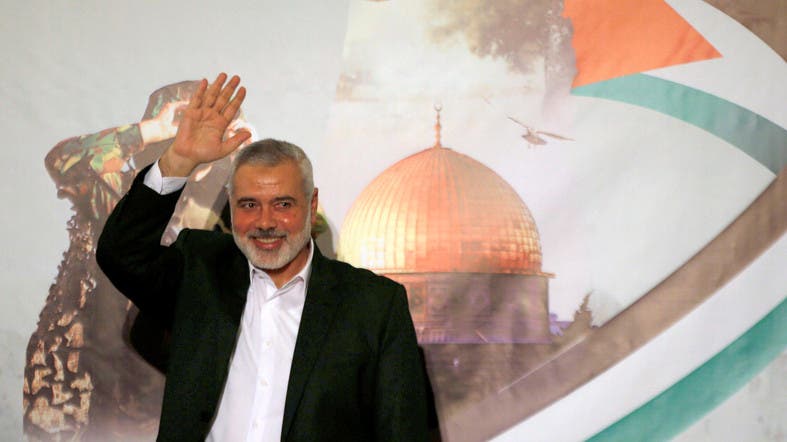Hamas dissolves Gaza government and agrees to national unity talks with Fatah

Hamas Chief Ismail Haniyeh waves before giving a speech in Gaza City. (File photo: Reuters)
Hamas said on Sunday it would do away with a body seen as an alternative government in the Gaza Strip in a step towards reconciliation with rival Fatah following discussions with Egypt.
Hamas, the Palestinian Islamist movement that runs the Gaza Strip, also said it was ready for talks with Palestinian president Mahmoud Abbas’s Fatah on forming a unity government and holding elections.
In a statement, Hamas said it was “responding to the generous Egyptian efforts, which reflect the Egyptian desire to end the split and achieve reconciliation, and based on our desire to achieve national unity.”
Egypt recently invited top Hamas officials to Cairo for reconciliation discussions, and last week, Abbas sent a delegation of representatives to Egypt as well.
Despite Sunday’s announcement, any reconciliation deal faces many obstacles. The deal was not clear whether Hamas is ready to place its security forces under Abbas’ control – a key sticking point that has scuttled past reconciliation attempts. There also was no comment from Abbas’ government.
It also was not immediately clear how Egypt’s latest effort aligns with its previous tacit support for a separate Gaza power-sharing deal between Hamas and Mohammed Dahlan, an exiled former Abbas aide-turned-rival.
In Sunday’s statement, Hamas spoke of the “dissolution” of what is known as the administrative committee, which was seen as a rival government to Abbas’s administration.
Hamas formed the committee in March, and since then Abbas has sought to put further pressure on the Islamist movement, reducing electricity payments for the Gaza Strip among other measures.
Hamas has run Gaza since 2007, having seized it in a near civil war from Fatah following a dispute over parliamentary elections won by the Islamist movement.
The Gaza Strip has faced deteriorating humanitarian conditions, with a severe electricity crisis and a lack of clean water, among other issues.
It has been under an Israeli blockade for around a decade, while its border with Egypt has also remained largely closed in recent years.
The coastal enclave of some two million people also has one of the world’s highest unemployment rates.
Facing those conditions, Hamas has turned to Egypt for assistance, particularly involving fuel to produce power.
Israel and Palestinian militants in Gaza, including Hamas, have fought three wars since 2008.
UN officials have called for the blockade to be lifted, but Israel says it is necessary to stop Hamas from obtaining weapons or materials that could be used to make them.
Last month, the Gaza head of Hamas, Yahya al-Sinwar, said the movement had increased its military capabilities thanks to newly improved relations with Iran, Israel’s arch-enemy.
Source:english.alarabiya.net
